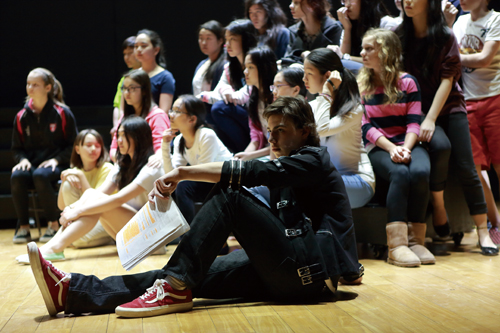
This year, April 23 marked the 450th anniversary of William Shakespeare’s baptism, with theater troupes and schools around the world staging performances, parades, and literary celebrations. But compared to the enormous cultural significance of Shakespeare’s output, very little is actually known about the famous playwright. Because the records of his birth are lost to history, the date celebrated as Shakespeare’s anniversary is actually the date of his christening.
He was born in Stratford-upon-Avon around 1549 to an affluent family, married an older woman at age 18, had three children, enjoyed a successful career as an actor and a playwright, and died around age 51. Though well-respected in his lifetime, Shakespeare wasn’t elevated to his present status until the 19th century, when his works were rediscovered by the Romantics and the Victorians. He is now the world’s most-performed playwright, with plays translated into every major living language and countless modern retellings in a variety of media.
A long-running controversy concerns whether Shakespeare actually wrote the 38 plays, 154 sonnets, and remaining works that made him famous. Some “anti-Stratfordians” attribute authorship to contemporaries such as Edward de Vere and Francis Bacon, whom they claim used “Shakespeare” as a pseudonym.
Controversy or no controversy, it’s impossible to overestimate the impact of Shakespeare’s works on the English language. Native speakers are familiar with the phrases “to be or not to be” or “wherefore art though Romeo?” but they might not be aware that Shakespeare also coined household phrases like “all of a sudden,” “vanish into thin air,” “good riddance,” “fair play,” and even “household words.”
For all their cultural significance, Shakespeare’s plays can still be challenging for modern readers. Ask any teenager and you’re likely to hear the descriptors “long” and “boring” – at least initially.

To Be, or Not to Be
It’s a Saturday in late March, and I’m sitting in the dark cocoon of the Wodehouse Theatre at Dulwich College Beijing (DCB). Dozens of Year 7 to 10 students are gathered here for a “cue-to-cue” rehearsal led by Drama and English Teacher Kenneth Hegarty. After practicing parts of Hamlet separately for the past six or seven weeks, the cast and crew are now bringing it all together “like a jigsaw puzzle.”
Hamlet is arguably Shakespeare’s most famous play. Sam Orlov, a Year 10 student who plays Prince Hamlet, sums it up rather nicely: “This story centers on my father dying and me trying to get over the grief, but I never actually manage to. Everything’s breaking down; my mom’s married to my uncle and my only friend is Horatio. All my other friends – whom I think are allies – have turned on me.” Along the way, Hamlet accidentally kills the father of his love interest, Ophelia, and she commits suicide by drowning in a river. The play culminates in a duel to the death between Hamlet and Claudius, causing the fall of Denmark.
Hamlet is the second of two plays that DCB stages every year. Following a “no-cut” policy at the auditions, the unprecedented cast size of around 80 students demanded a massive feat of coordination. “You can’t do a production like this on your own,” says Hegarty. Behind the scenes, three IB students help Hegarty work out music, lighting, and visual cues. Some of the cast students also contributed costume designs, music, and film work.
To pad out the scenes, Hegarty broke up certain lines of dialogue and spread them between several actors. For example, most productions of Hamlet have only two gravediggers; DCB’s version has six. The production also makes heavy use of multimedia elements like projection and sound design to create a post-modern feel.

One scene features a play within a play that Hamlet stages in front of the court to hint to Claudius that he knows who killed his father. “To capture the impression that someone knows, we’ve done some close-up work so the audience will see [Claudius’] reactions,” says Hegarty. “We do a visual trick where the ghost [of Hamlet’s father]appears in the audience and another performer who’s dressed in exactly the same outfit appears on stage to give the idea that the ghost is appearing in different sections of the room.”
I speak with four DCB students: Sam Orlov (age 15), Andie Villegas, Alice Hawkins, and Endani Munyai (all 14). Alice and Endani are from South Africa, Sam is from the UK, and Andie is from the Philippines.
Except for Endani, who wasn’t very familiar with Shakespeare before DCB, all profess an intense admiration for the Bard’s works. Both Andie and Sam fell in love with Shakespeare through Doctor Who actor David Tennant, who played Hamlet in a BBC television adaptation, while Alice is a self-confessed “hopeless romantic” whose first exposure to Shakespeare was Baz Luhrmann’s Romeo and Juliet.
The young actors frequently break into laughter, recount inside jokes, and talk over each other in their eagerness. When asked about most challenging aspect of Hamlet, Andie immediately answers “dying.” “[As Polonius], I’m supposed to yell out my last line in great anguish and pain. I never really did a dying scene before; the first time, I sounded so sarcastic. As soon as I hit the floor, I thought ‘That’s not how you deliver that line.’”
For Sam, the real struggle is offstage. “I’m dyspraxic [a disorder that affects movement, coordination, and cognitive skills], so learning a lot is hard. When I got the initial script, my first thought was ‘Oh Sam, you’re gonna have to learn so much.’ I went straight home and highlighted everything. It was the holidays, and I just said ‘Listen mum, we’re gonna do this.’ We recorded the whole [script], I put it on my laptop and listened to it every night while reading it.
“Now, my greatest challenge is just knowing where to be,” he continues. “When I kill Polonius, I have to go from that side of the stage [gestures to stage right], pick up a sword, and go there [gestures to stage left]while delivering a line, so it’s very technical. And I’ve never played a part so big. It’s a challenge, but it’s a very fun challenge. Now I’m like, ‘I can do this.’
Their teacher, Mr. Hegarty, smiles as Sam is speaking. “That’s one of the absolute joys of working with students like this,” he says. “Sam is dyspraxic, but these things are left at the door because the students enjoy being involved in theater. To see the lengths that these guys will go to learn lines, to think about character, and the confidence it brings them – this is why we do performances every year.
He turns to Sam. “For someone who’s got a moderate learning difficulty, learning the lines to Hamlet – fair play to you. You’re doing such a good job. And the confidence that you’ll take from this, it’s a life-long thing, isn’t it?”

The students’ confidence is not the only thing to have changed as a result of being in Hamlet; their relationship with the playwright has as well. “My love for Shakespeare has grown, if that’s at all possible,” says Andie. “They’re so beautiful, these words. Being in a production of my favorite Shakespeare play ever has made everything so much more personal to me, so I love it.”
“You can’t come up with the right words to explain,” says Alice.
“Because it’s so good!” replies Andie. “What I also love about Shakespeare is how it’s so infinitely relatable. Like ‘to be or not to be’ – it’s healthy for everybody to question their existence at least once.”
“I can’t wrap my head around [Shakespeare] being irrelevant because at the end of the day, our history is the history of the English language,” reflects Alice. “That’s why Shakespeare will stick around.”

Double, Double Toil and Trouble
Further south in Wangjing, Year 10 students Beijing World Youth Academy (BWYA) are also discovering Shakespeare. They’re fresh off a staging of Macbeth, one of the Bard’s darkest works. The story follows a Scottish general called Macbeth who becomes obsessed with power after three witches prophesize that he will become king. His wife, Lady Macbeth, urges him to murder the good King Duncan, after which the couple goes slowly mad from the consequences of guilt. Standard Shakespeare fare, in other words.
Though BWYA’s production also stars middle schoolers, that’s where the similarities end. Led by Drama Teacher Kelvin Lamplough and Music Teacher Jan Rues, the entire grade was involved in the preparation of the play. Students acted, composed music, made costumes, designed promotional posters, painted backdrops, and even constructed a massive papier mache monster to be conjured by the witches.
Every year, Lamplough (known as “Mr. Kel”) has Year 9 students prepare a few scenes from a Shakespeare play to introduce them to his works. Then, about a month before the start of the next academic year, he and Rues meet to talk about which Shakespeare play to stage with Year 10 students, how to do different scenes, and where to incorporate music.
I speak with him and four of the students involved in the play: Katya Antonenko (Russia), Evan Yu (Taiwan), Matt Hsiun (US), and Bill Ding (China). Katya and Evan are both 16, and Matt and Bill are 15. Katya plays Lady Macduff, the wife of a murdered Scottish lord, and Bill plays King Duncan, while Matt and Evan play violin and bass respectively in the orchestra. Matt and Evan also composed some incidental music – short 30-second to one-minute pieces used to transition between scenes or set the mood.

To call BWYA’s production of Macbeth “modern” is an understatement. “Ask us about the best scenes,” says Rues. When I oblige, the students excitedly call out highlights from the play. “In the opening scene, we wore masks, chose the most memorable and famous lines from the play, and said them with some [movements],” says Katya.
“But before that, there was the Guns N’ Roses song [“Live and Let Die”],” reminds Evan.
“I really put my Garage Band skills to the test there,” jokes Rues. “I created a big thunder, lightning, and rain scene.”
“The fog smells really weird,” recalls Bill.
“We also had a rap [“Radioactive” by Imagine Dragons featuring Kendrick Lamar] with live instrumentation,” continues Rues. “Evan played the bass line.”
“The [papier mache]monster had orange paint that glowed in the dark,” adds Katya. “When the light changed, it seemed to be a different color.”
“We opened the second act with a dance by the witches and a few [other of the students],” says Rues. “As music, we chose [the theme from]Ghostbusters because Banquo’s ghost would haunt Macbeth throughout that second act.”

However, Macbeth is more than just about funny dances and pop culture references; this multi-disciplinary approach also allows the students to approach the material from different angles. For example, Matt was challenged with creating music for a battle scene. “It wasn’t as hard as I thought,” he says. “But I never got to see the scene [beforehand], so I had to imagine it. I listened to battle music from movies and other media, then incorporated those ideas into the piece.”
Evan first discovered Shakespeare through Romeo and Juliet in English class, but Macbeth gave him the chance to collaborate with others – and even gain some insight into his own working habits. “I composed a transition scene, but I had help from my teammate and the other bassist,” he says. “My collaborator – how do I put this? We’re really good friends, but somehow when we’re together we get very little work done, so we had to find a third party. He was very helpful. [Composing] didn’t take as long as I anticipated, but it’s not the easiest thing I’ve done.”
From a teacher’s point of view, the benefits are plain to see. “Setting up these situations and acting them out gives you a better understanding of what Shakespeare meant and how he set up these conflicts, how these different characters made their decisions in various scenes,” says Rues.
“Lots of people say his plays are boring and hard to understand, but once you understand, it’s something that I think all of us would want to do,” concludes Bill.
When the interview is over, I reflect on the improbability of teenagers from different parts of the world speaking 400-year-old lines in the same language and dealing with themes as dark as incest, suicide, insanity, corruption, and lust. I set out thinking this article would be about how teachers in Beijing are making Shakespeare engaging for students, but I was wrong; it turns out that this is a story about his enduring relevance to future generations. As 15-year-old Sam Orlov puts it, “It’s made a permanent mark in history.”
Famous Last Words
On discovery: “For me, [Hamlet] has been a gateway into Shakespeare. It’s been around for 500 years already; I bet it will stay for another 500.” – Endani Munyai, 14, South Africa, Dulwich College Beijing
On performing: “Everything is left at the door when you’re in someone else’s shoes. You can be funny, you can be mad, you can be upset or angry. Everything that happened to you, you can forget about for that short amount of time.” – Alice Hawkins, 14, South Africa, Dulwich College Beijing
On experience: “There’s a difference between seeing the play being performed and reading it yourself. The actors need to know the lines and say them with emotion and panache; actually seeing our friends and acquaintances do it, it’s something new and very good.” – Evan Yu, 16, Taiwan, Beijing World Youth Academy
On friendship: “You get so close to the cast members. Endani and I were new to the school, but I feel I’ve made some pretty good friends. I see Sam every morning because we’re in the same tutor group, so on Wednesdays and Thursdays [when we rehearse], we’ll have the scripts out and say ‘OK, so which scene are we gonna rehearse?’” – Andie Villegas, 14, Philippines, Dulwich College Beijing
On language: “If you had a simplified version [of a Shakespeare play], you wouldn’t have the same emotion as when you read the original script. That’s because Shakespeare used words and grammar to highlight the plot and characters.” – Katya Antonenko, 16, Russia, Beijing World Youth Academy
On corruption: “If we take Macbeth as an example of how a respectable man can fall to become a tyrant, if we review the course of history – or even now – we can see that there are many people similar to him.” – Matt Hsiun, 15, US, Beijing World Youth Academy
On the future of Shakespeare: “As time passes, people’s perspectives change and [culture creators will]have to think about what would interest them the most. Even though Shakespeare will live on, there will be different versions [of his works].” – Bill Ding, 15, China, Beijing World Youth Academy
On Shakespeare’s legacy: “If you go up to Year 3s or Year 4s, they may have not studied Hamlet but they will always know that line ‘to be or not to be.’ [Hamlet] may be old, but it very much focuses on relatable aspects – war, love, hate, sorrow, anger, family, depression, grief.” – Sam Orlov, 15, UK, Dulwich College Beijing
This article originally appeared in the June 2014 issue of beijingkids. To find out where to get your free copy, email distribution@truerun.com or view it on Issuu.
Photos: Ken and courtesy of BWYA



